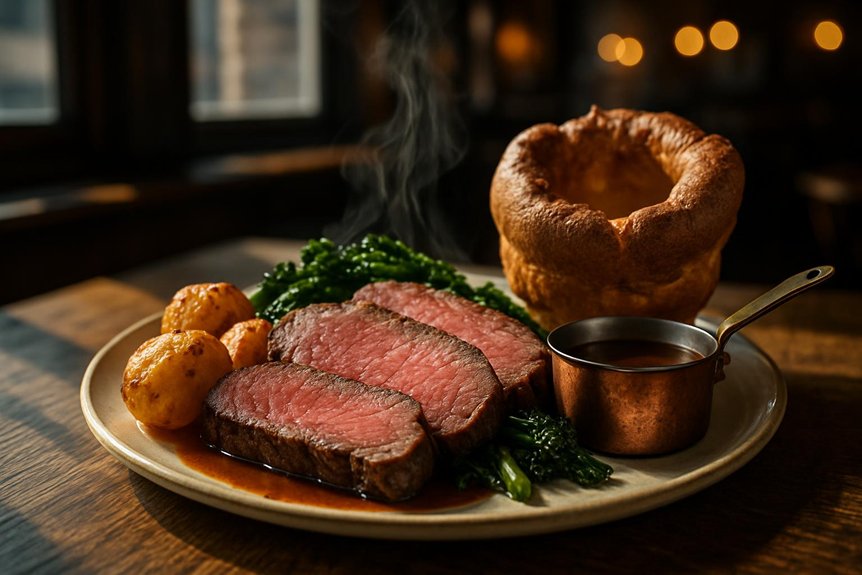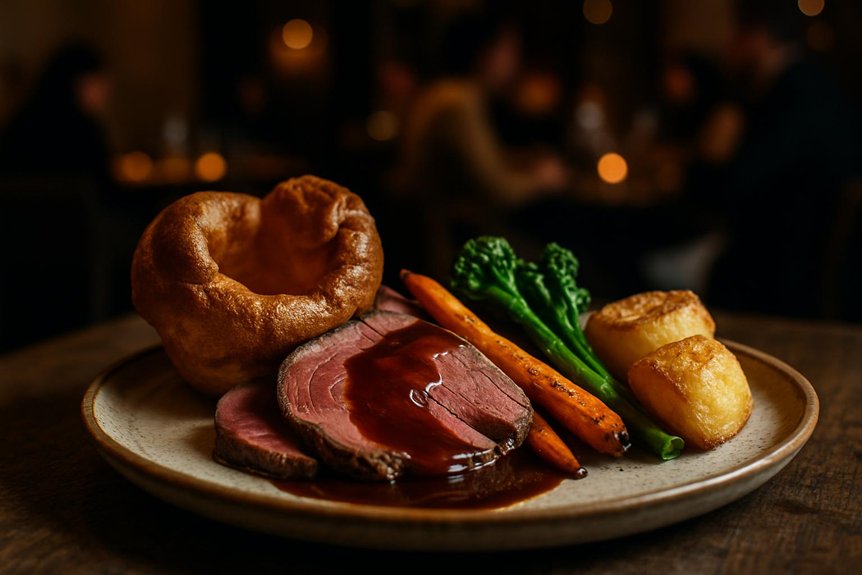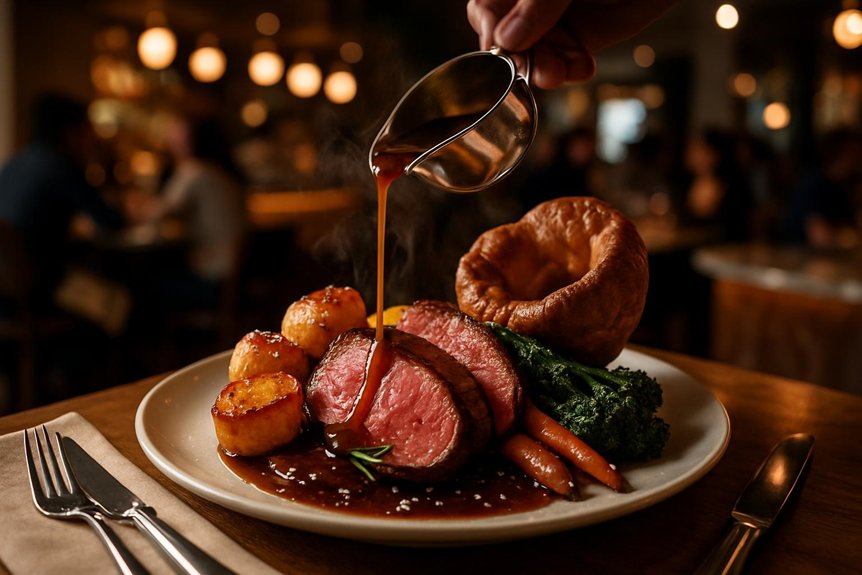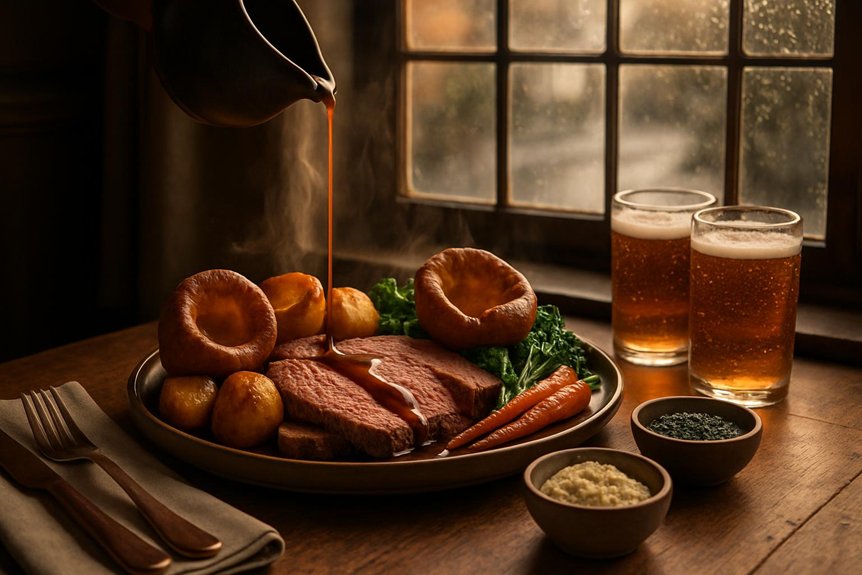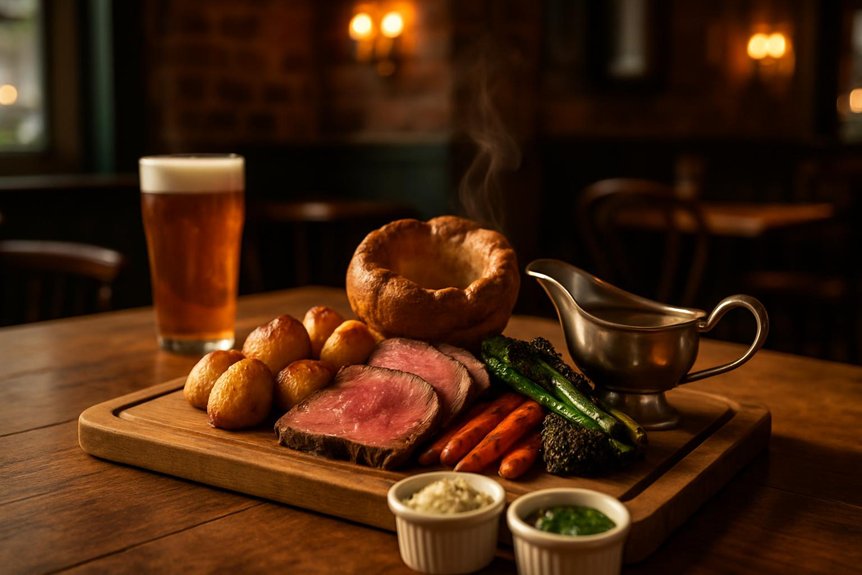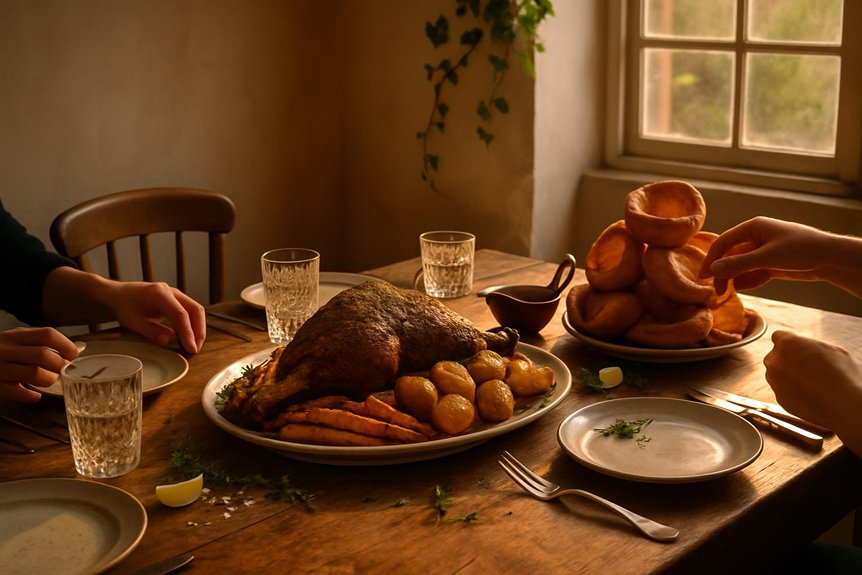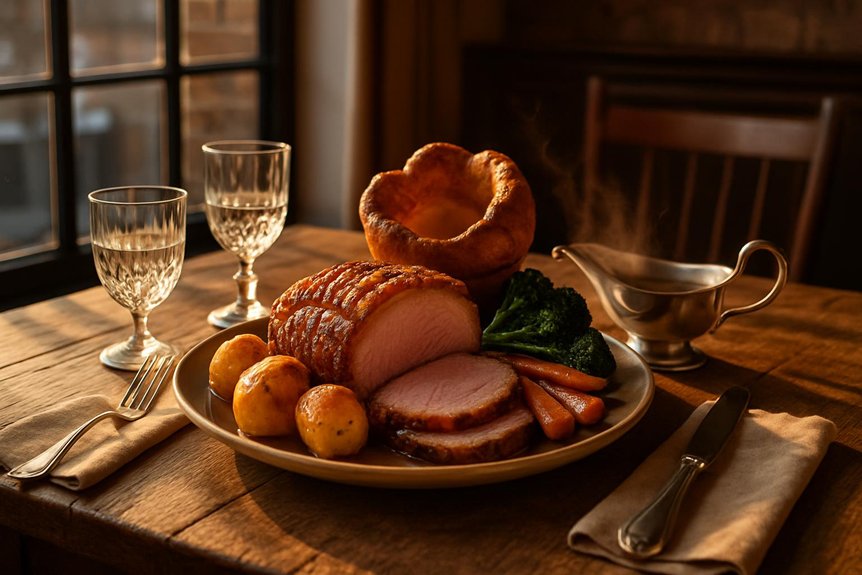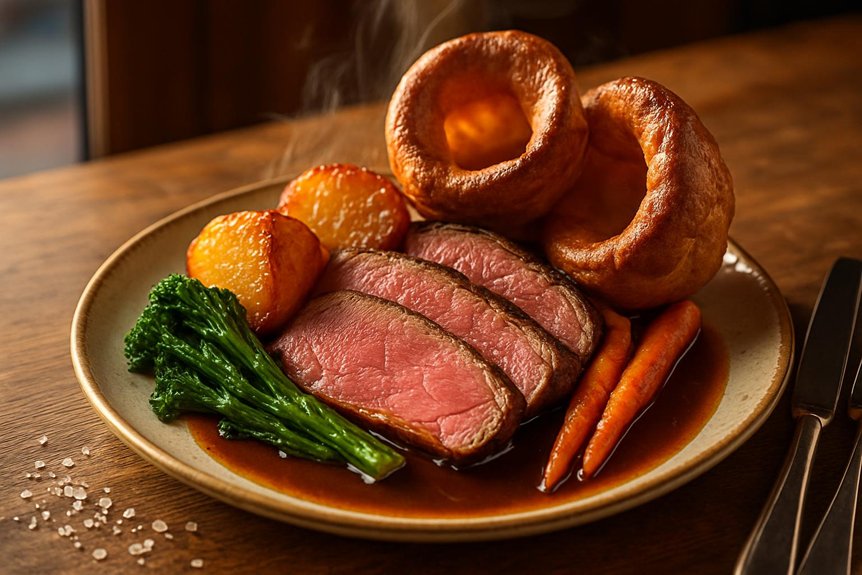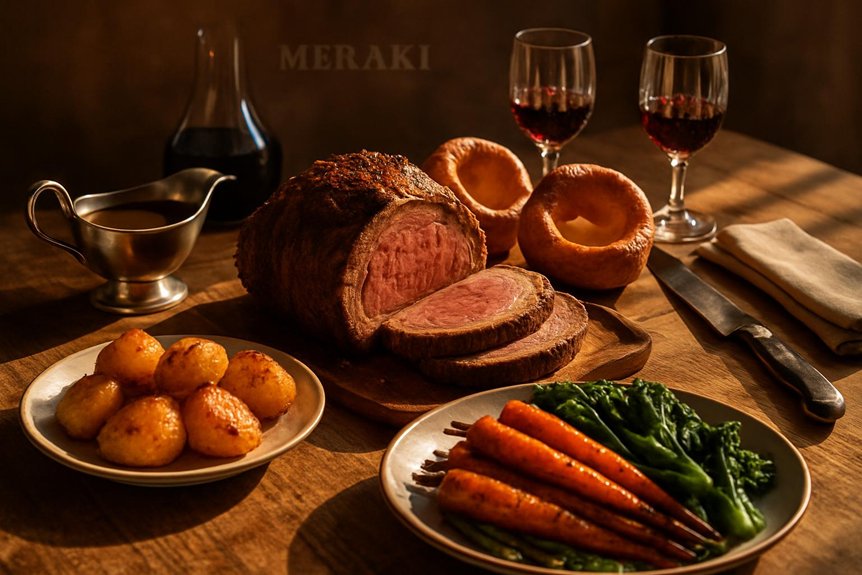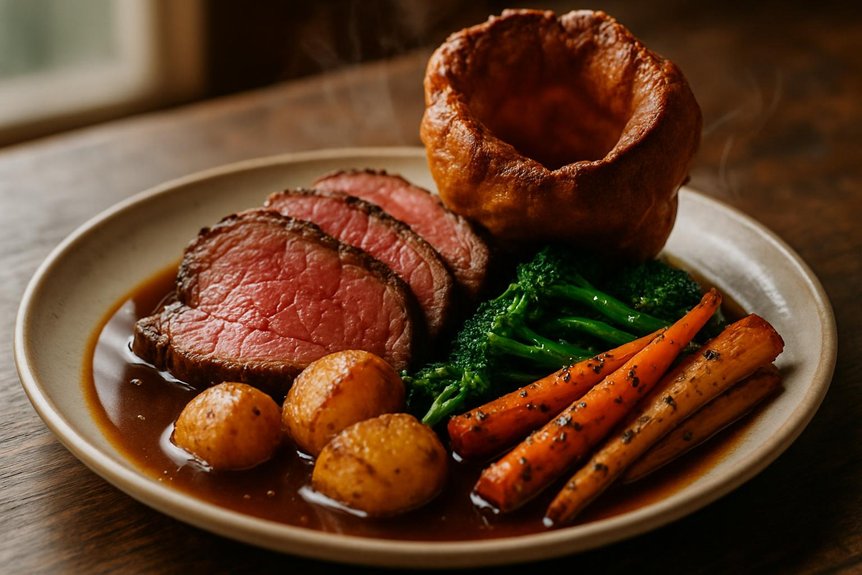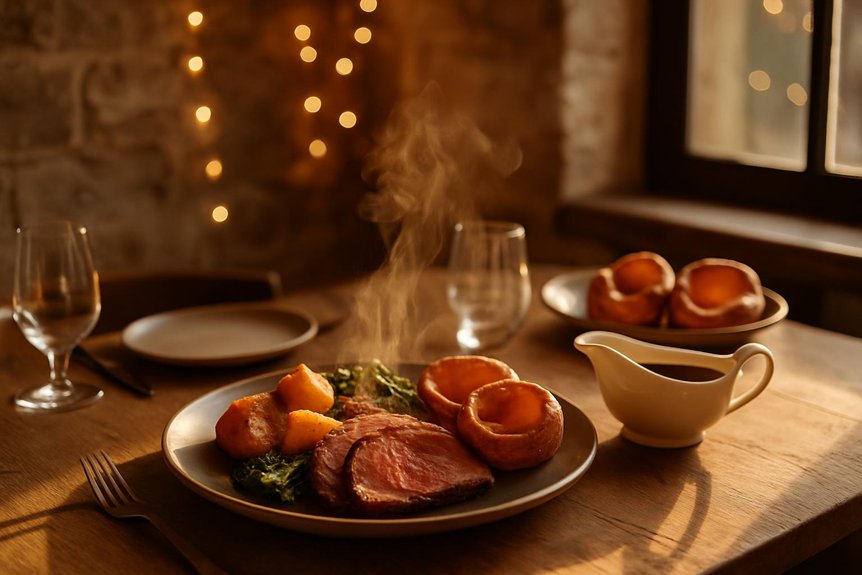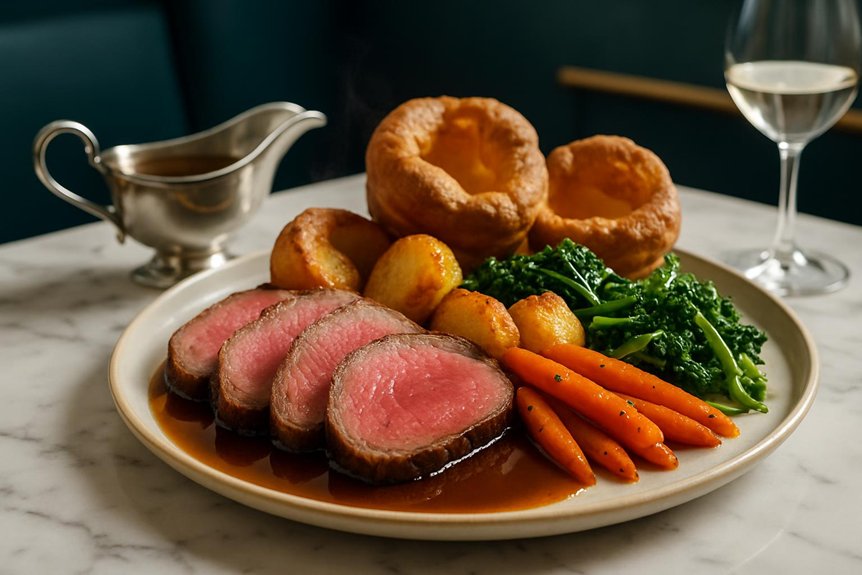Londoners are talking about a Sunday roast that respects tradition while borrowing finesse from Greece. At Meraki, slow-roasted meats arrive with herb-brushed finishes, crisp Yorkshire puddings, and potatoes that shatter under a fork. Seasonal greens and bright gravies keep the plate balanced rather than heavy. The approach is careful, not flashy. What makes it stand out is not a gimmick, but restraint and craft—plus a few choices that can change the entire experience.
Why Meraki’s Sunday Roast Has London Talking
Among London’s many Sunday roasts, Meraki stands out for precision and consistency. Diners note timing that keeps meats succulent and sides crisp, with portions balanced rather than excessive. The kitchen’s pacing ensures plates arrive hot, gravies glossy, and vegetables vibrant, avoiding the sogginess common elsewhere.
Attention to detail shapes each element. Yorkshire puddings rise uniformly, potatoes are deeply caramelized, and jus carries structure without overpowering. Textural contrast is deliberate: crackling shatters cleanly, greens retain bite, and artisanal bread offers a sturdy counterpoint for soaking sauces.
At Meraki, the modern and stylish décor with bare brick walls and glass-fronted wine cases adds to the dining experience, making it not only about the food but also the ambiance.
Accents like seasonal compotes bring brightness and restraint, invigorating the palate between bites. Service mirrors the kitchen’s discipline—quietly efficient, unobtrusive, and consistent—making the experience predictable in the best sense and worthy of repeat visits.
Greek Flair Meets British Tradition
While rooted in British ritual, Meraki’s roast weaves in Greek sensibilities with quiet confidence. The plate respects the classic framework—roast meat, seasonal vegetables, gravy—yet reframes it through Fusion cuisine that feels effortless rather than showy.
Mediterranean flavors surface in measured accents: lemon-kissed herb rubs, oregano-bright jus, and olive oil glossing greens for lift without heaviness.
Yorkshire pudding arrives crisp but subtly perfumed, inviting pairing with tangy yogurt-based accompaniments instead of customary sauces.
Roast potatoes gain character from thyme and garlic that nod to the Aegean pantry. Even table condiments lean sunlit, with citrus, capers, and discreet anise warmth.
The result is not novelty for its own sake; it is a considered dialogue where British comfort meets Greek clarity, producing resonance and balance. Meraki’s relaxed dining experience offers a chance to dine at home, allowing you to savor their signature Greek-infused roast in comfort.
The Art of Slow-Cooked Perfection
Greek inflections set the stage, but the roast’s authority comes from time and temperature handled with restraint. Here, patience defines excellence: low heat coaxes collagen to silk, aromatics steep into the joint, and resting ensures juices redistribute. The result speaks quietly—tenderness without collapse, depth without heaviness—an expression of family tradition translated through rigorous culinary craftsmanship. At Meraki, exceptional service from their welcoming staff enhances the dining experience, making each dish feel like a special occasion.
- Select the cut: well-marbled beef or lamb with consistent thickness for even rendering and balance.
- Season with intent: restrained salinity, pepper warmth, and herb notes that complement, not dominate.
- Control the cook: stable low temperatures, periodic basting, and an unwavering respect for internal benchmarks.
- Rest and carve: a calm pause, then decisive slicing across the grain to preserve moisture and structure.
Precision turns comfort into distinction.
Crispy Potatoes and Standout Sides
A plate lives or dies by its potatoes, and the benchmark is a shattering shell over a steaming, fluffy interior. Meraki’s potato preparation favors parboiling, rough-edging, and a blistering roast in rendered fat, yielding crisp crags and a tender core. Salt is applied twice—once hot for adhesion, once at service for brightness—so each bite lands clean and focused.
Standout sides are treated with the same intent. Yorkshire pudding rises tall and airy, acting as a vessel for drippings without turning soggy.
Seasonal greens arrive with snap intact, glossed in lemon and olive oil rather than weighty cream. Carrots are roasted to caramelized edges, their sweetness cut by thyme.
Among side dish variations, tangy pickled onions and horseradish cream deliver contrast, keeping the plate lively.
Succulent Meats and Herb-Brushed Finishes
A superior roast often starts with prime cuts—aged beef sirloin, pork loin with cap, or corn-fed chicken crowned by crisp skin.
Kitchens employ a hot herb-brush of thyme, rosemary, and parsley in butter or dripping to glaze and perfume the exterior.
Proper resting locks in juices, ensuring slices that are tender, glossy, and evenly rosy edge to edge.
Prime Cuts Selection
Few elements define a standout Sunday roast more decisively than its prime cuts: impeccably sourced beef sirloin with a rosy center, pork loin capped by shattering crackling, and lamb leg or shoulder melting to the slice. Meraki’s Prime Cuts Selection privileges provenance, marbling, and consistent sizing to ensure balanced plates and accurate cooking windows.
The beef selection emphasizes grass-fed depth without overpowering minerality; pork is chosen for fat-to-flesh harmony; lamb favors young, sweet character.
1) Beef sirloin: uniform grain for even slices, restrained aging for tenderness and clarity.
2) Pork loin: rind scored for clean crackling, kept juicy by precise trimming.
3) Lamb shoulder or leg: collagen-rich cuts yielding supple texture.
4) Considered vegetarian options: roasted celeriac steak and mushroom Wellington mirror carving-room drama.
Herb-Brush Technique
Herb-brushing delivers succulence and aromatic lift by marrying hot fat with fresh, volatile oils at the finish.
In Meraki’s kitchen, the herb brush technique is executed with sprigs of thyme, rosemary, and marjoram bound to a stalk of celery, then dipped in rendered pan fat. The brush glides over seared beef or lamb in swift passes, releasing essential oils that bloom on contact with heat.
This approach distinguishes itself from marinades by targeting the final minutes, preserving brightness while amplifying crust complexity.
Among flavor infusion methods, it offers precision: controlled salinity, selective bitterness from stems, and citrus top notes from zest-laced fat.
Brushes are refreshed frequently, ensuring clean aromatics and preventing scorched particles from muddying the roast’s finish.
Juices and Resting
Momentum from the herb-brushed finish depends on what happens off the heat: the roast must rest so juices redistribute rather than flood the board. Observers note that Meraki times this pause with precision, letting fibers relax while the crust holds aromatics. The result is slices that glisten without weeping, preserving seasoning definition and enhancing Meal presentation. Resting also aligns with Dining etiquette: calm service, clean plates, and consistent portions.
- Resting window: 10–20 minutes under loose foil to prevent steam-soggy crusts.
- Carryover heat: internal temperature rises 3–5°C, finishing doneness without dryness.
- Slice direction: across the grain to keep juices within each slice.
- Herb-brushed finish: a final swipe before carving refreshes volatile oils, releasing brightness without diluting the meat’s succulence.
Seasonal Produce at the Heart of the Plate
Seasonality drives the best roasts, with kitchens sourcing vegetables and herbs directly from local farms. Farm-to-table produce shapes the plate’s character, from crisp roots to leafy greens at peak freshness.
Rotating seasonal sides keep the experience dynamic, matching the roast with what’s best that week.
Farm-To-Table Sourcing
A true measure of a standout Sunday roast in London is how closely it follows the rhythm of local fields and markets. Meraki’s approach to farm-to-table sourcing is methodical: ingredients are chosen at peak freshness, with traceability that links each cut and crop to named growers. This transparency supports sustainable practices and strengthens local partnerships, ensuring consistency without compromising character.
- Direct sourcing from regional farms verifies animal welfare and reduces transit time, preserving flavor and texture.
- Longstanding relationships secure priority access to limited, high-quality batches, stabilizing quality through the year.
- Harvest-informed menus guide butchery choices and roasting techniques, aligning cooking times with natural moisture and marbling.
- Minimal-intervention logistics—short supply chains, careful storage—protect nutrient integrity and deliver a clean, honest roast profile.
Rotating Seasonal Sides
In rotating seasonal sides, the plate reflects what London’s markets do best: timely produce prepared with restraint and purpose. Meraki lets the calendar lead, so each Sunday roast arrives with sides that change as the fields do. Early spring might bring charred asparagus with lemon oil; summer leans into blistered courgettes and tomato relish.
When the air cools, roasted roots, cavolo nero, and butter-braised leeks step forward.
Technique stays constant: minimal handling, clean seasoning, precise heat. The seasonal vegetable is treated as a main actor, not garnish. Servers point guests to the chef’s recommendation, often the side that best counters the roast’s richness—perhaps pickled beets with horseradish, or thyme-glazed carrots.
The result is balance, freshness, and a reason to return next week.
Where to Sit for the Best Experience
Though the allure of a crackling fire and polished wood is strong, seating can make or break a Sunday roast. Observant diners choose their spot with intent: acoustics, lighting, and pacing determine whether the meal feels celebratory or rushed. Meraki’s layout offers distinct moods without compromising service cadence or plate temperature.
- Cozy corner seating: ideal for small groups seeking quieter conversation and steady warmth; servers navigate discreetly, keeping courses seamless.
- Banquette clusters: balanced sightlines and soft upholstery temper chatter, suiting families or mixed parties.
- Chef-adjacent tables: livelier energy and brisk refills; aromas amplify anticipation without overwhelming the palate.
- Open air terrace: for those preferring London’s light and gentle breeze; heaters and blankets extend comfort while preserving crisp textures.
What to Order for First-Timers and Purists
First-timers and purists should start with classic roast essentials: properly rested beef or pork, crisp Yorkshire pudding, and seasonal veg.
They can add must-try signature sides—such as duck-fat potatoes, cauliflower cheese, or buttered greens—for balance and texture.
For sauce and doneness, gravy should be glossy and well-reduced, horseradish or apple sauce used sparingly, and beef ordered medium-rare unless house guidance suggests otherwise.
Classic Roast Essentials
A classic Sunday roast starts with choosing a main: roast beef with Yorkshire pudding is the benchmark, while roast chicken offers comfort and pork belly brings crisp crackling.
For first-timers and purists, the essentials focus on quality meat, balanced condiments, and reliable dietary accommodations such as vegetarian options and gluten free adaptations.
Precision in temperature, seasoning, and resting time defines the experience.
- Roast beef: medium-rare slices, rich pan gravy, and a towering Yorkshire pudding; request gluten free adaptations for gravy and batter if needed.
- Roast chicken: herb-basted, juicy breast and thigh, classic bread sauce, and clear, shimmering jus.
- Pork belly: lacquered skin, tender layers, sharp apple condiment to cut the richness.
- Vegetarian options: nut roast or mushroom Wellington, robust gravy, and crispy roast potatoes.
Must-Try Signature Sides
With the meats and timings squared away, attention turns to the plate’s supporting cast—the sides that signal a proper London roast. First-timers should secure a towering Yorkshire pudding: crisp edges, custardy center, ideal for soaking.
Roast potatoes come crackly and golden, their interiors fluffy and seasoned assertively. Buttered seasonal greens provide freshness; charred Hispi cabbage or tender-stem broccoli adds contrast.
Purists look for carrots roasted with thyme and honey, and cauliflower cheese with a browned, tangy crust. A horseradish-root slaw offers bite without heaviness.
For dietary options, request olive-oil roasties, dairy-free greens, or a gluten-free Yorkshire on advance notice. To round the table cleanly, choose a light dessert pairing—lemon posset or baked apple—so the sides’ richness remains the meal’s lasting impression.
Sauce and Doneness Tips
How best to navigate sauces and doneness on a London roast plate? First-timers and purists approach Meraki’s platter differently, yet both benefit from clear choices.
The kitchen’s cooking techniques prioritize texture: rosy beef, juicy chicken, or tender lamb, each paired to sauces that lift rather than mask. Fusion flavors appear sparingly, supporting the roast’s core character.
- For first-timers: choose medium-rare beef; its marbling suits classic gravy and horseradish, offering balance without overwhelm.
- For purists: request rare or medium lamb, add mint sauce lightly, and keep pan gravy central.
- Prefer chicken? Opt for juicy medium, with lemon-thyme jus; skip heavy condiments.
- Curious about fusion flavors? Try a miso-onion gravy or harissa-mint drizzle, ordered on the side to preserve integrity.
Pairing Wines and Cocktails to Elevate Your Roast
Though the roast takes center stage, thoughtful pairings amplify every element on the plate. At Meraki, vine pairing focuses on balance: dry English sparkling cuts through crackling, while a textured Chardonnay complements chicken’s buttery glaze.
For beef, a Syrah with peppery lift mirrors the Maillard richness; lamb finds harmony with a mineral Greek Xinomavro or elegant Rioja, both bright enough for herb-laced jus.
Cocktail crafting follows the same logic. A crisp Martini with a lemon twist sharpens the palate before the first bite; a rosemary gin highball echoes garden aromas without overwhelming the roast.
For deeper cuts, a Manhattan with restrained sweetness aligns with caramelized edges. Nonalcoholic options—verjus spritzers or tea-based sours—deliver structure and acidity, sustaining momentum from appetizer to final slice.
How to Book and Plan the Perfect Sunday at Meraki
From the first click to the final toast, planning a Sunday at Meraki rewards early, deliberate choices. Securing table reservations a week or two ahead guarantees prime seating windows and access to the full roast menu.
Guests should confirm party size, preferred seating, and any timing constraints, then note dietary accommodations—gluten-free Yorkshire, plant-forward sides, or dairy-light gravies—so the kitchen can prepare seamlessly.
To streamline the day, consider pre-selecting wine or cocktails to match the roast’s pace.
- Reserve early online, selecting ideal time slots and confirming table reservations.
- Communicate dietary accommodations and allergies when booking.
- Coordinate travel plans; allow a cushion for pre-meal drinks.
- Plan post-roast coffees or digestifs, settling the bill smoothly to avoid delays.
A well-planned schedule keeps the experience effortless and memorable.
Conclusion
As plates are cleared, Meraki’s Sunday roast lingers in memory—Greek nuance woven into British comfort, each bite a study in slow-roasted craft and crisp-edged satisfaction. Herb-brushed meats, golden potatoes, and buoyant Yorkshire puddings meet vivid gravies and bright seasonal greens. With thoughtful pairings and attentive pacing, even first-timers feel like insiders. Where to sit, what to sip, how to savor—doesn’t the scene write itself? For those seeking tradition, lifted, Meraki makes Sunday feel effortlessly special.
